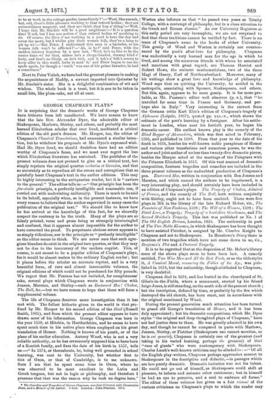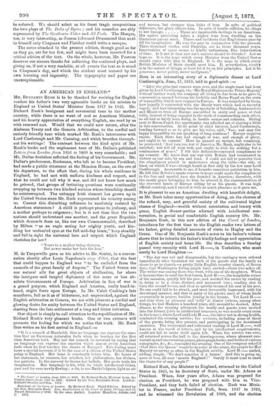GEORGE CHAPMAN'S PLAYS.* IT is surprising that the dramatic works
of George Chapman have hitherto been left uncollected. We have reason to know that the late Rev. Alexander Dyce, the admirable editor of Shakespeare, Marlowe, Shirley, and others, and probably the most learned Elizabethan scholar that ever lived, meditated a critical edition of the old poet's dramas. Mr. Hooper, too, the editor of Chapman's Classical Translations, bad announced a similar inten- tion, but he withdrew his proposals at Mr. Dyce's expressed wish. Had Mr. Dyce lived, we should doubtless have had an edition worthy of Chapman's fame, and we must ever regret the loss which Elizabethan literature has sustained. The publisher of the present volumes does not pretend to give us a critical text, but simply reprints the original quartos verbatim et literatim, and that so accurately as to reproduce all the errors and corruptions that so painfully beset Chapman's text in the earlier editions. This may be highly interesting to the antiquarian reader, but it is " caviare to the general." The editor tells us: —" Our principle has been the fac-simile principle, a perfectly intelligible and reasonable one, if carried out with undeviating uniformity. There is much to be said in its behalf, especially when, as in the present instance, we have every reason to believe that the author supervised in many cases the publication of the original text." We should like to know how he has arrived at the knowledge of this fact, for we shrewdly suspect the contrary to be the truth. Many of the plays are so falsely printed, verse and prose being so strangely intermingled and confused, that it appears almost impossible for the author to have corrected the proof. To perpetuate obvious errors appears to us simply ridiculous, nor is the principle so " perfectly intelligible" as the editor seems to think. We are never sure that such egre- gious blunders do exist in the original rare quartos, or that they may not be due to the inaccuracy of the modern copyist. This, of course, is not meant to be a popular edition of Chapman's plays, for it would be almost useless to the ordinary English reader ; but it places before the scholar an accurate reprint, and in a very beautiful form, of rare and almost inaccessible volumes, the original editions of which could not be purchased for fifty pounds. We regret that Mr. Pearson has not included, for completeness' sake, several plays which Chapman wrote in conjunction with Jonson, Marston, and Shirley—such as Eastward Hoe! Chabot, The Ball, &c.—but we have reason to hope that these will form a supplemental volume.
The life of Chapman deserves more investigation than it has met with. The fullest hitherto given to the world is that pre- fixed by Mr. Hooper to his second edition of the Iliad (Russell Smith, 1865), and from which the present editor appears to have drawn most of his information. George Chapman was born in the year 1559, at Hitchin, in Hertfordshire, and he seems to have spent much time in his native place when employed on his great translation of Homer. Nothing is known of his youth, or of the place of his earlier education. Antony Wood, who is not a very reliable authority, as he has erroneously supposed him to have been of a Kentish family, and fixes the date of his birth in 1557, tells us :—" In 1574, or thereabouts, he, being well grounded in school learning, was sent to the University, but whether first to this of Oxon, or that of Cambridge, is to me unknown. Sure I am that he spent some time in Oxon, where he was observed to be most excellent in the Latin and Greek tongues, but not in logic or philosophy, and therefore I presume that that was the reason why he took no degree here."
* The Comedies and Tragedies of George Chapman, now first Collected, with Illustrative Noses, and a memoir of the Author. 8 vols. London : John Pearson. 1873.
Warton also informs us that " he passed two years at Trinity College, with a contempt of philosophy, but in a close attention to the Greek and Roman classics." As our University Registers at this early period are very incomplete, we are not surprised to find that these traditions cannot be verified by fact. There is no trace of Chapman's name in the books of either University. This gossip of Wood and Warton is certainly not counten-
anced by the poet's after-love for philosophy. Chapman was undoubtedly a very learned man for the age in which he lived, and among the numerous friends with whom he associated and mentions with great regard, are Thomas Harriot and Robert Hews, the eminent mathematicians, two of the three Magi of Henry, Earl of Northumberland. Moreover, many of his writings show a great love and knowledge of philosophy. Wood says that on quitting the University, he settled in the metropolis, associating with Spenser, Shakespeare, and others. But this, again, appears to be mere gossip. It is far more pro- bable, as Mr. Pearson's editor well observes (p. x.), that "he travelled for some time in France and Germany, and per- haps also in Italy." Very interesting is the extract from the German critic Karl Elze's edition of Chapman's tragedy of Alphonsus (Leipzic, 1867), quoted pp. xxx.-v., which shows the estimate of the poet's learning by a foreigner. After his settle- ment in London, when near his fortieth year, he began his dramatic career. His earliest known play is the comedy of the Blind Beggar of Alexandria, which was first acted in February, 1595, and published in 1598. From that year to the date of his death in 1634, besides his well-known noble paraphrase of Homer and various other translations and numerous poems, he was the author and joint author of no less than twenty-five dramatic pieces, besides the Masque acted at the marriage of the Palsgrave with the Princess Elizabeth in 1613. Of this vast amount of dramatic composition, fourteen tragedies and comedies are included in the three present volumes as the undoubted production of Chapman's pen. Eastward Hoe, written in conjunction with Ben Jonson and Marston, and which caused the authors to be imprisoned, is a very interesting play, and should certainly have been included in an edition of Chapman's plays. The Tragedy of Chabot, Admiral of France, and the comedy of The Ball, both written conjointly with Shirley, ought ,not to have been omitted. There were five playa in MS. in the library of the late Richard Heber, viz., The Fountain of New Fashions, 1598 ; The Will of a Woman, 1598 ; The Fatal Love, a Tragedy; Tragedy of a l ork.shire Gentleman, and The Second Maiden's Tragedy. This last was published as No. 1 of The Old English Drama, London, 1825. The authorship in part of The Two Noble Kinsmen, in which Shakespeare has been thought to have assisted Fletcher, is assigned by Mr. Charles Knight to Chapman and not to Shakespeare. In Henslowe's Diary there is mention of two tragedies which have not come down to us, viz., Benjamin's Plot and A Pastoral Tragedy.
It is to be regretted that at the dispersion of Mr. Heber's library some of the above plays seem to have been lost. A comedy entitled, Two Wise Men and All the Rest Fools, or as the title styles it, A Comical Moral, censuring the Follies of the Age, was pub- lished in 1619, but the authorship, though attributed to Chapman, is very doubtful.
Chapman died in 1634, and lies buried in the churchyard of St. Giles's-in-the-Fields, where a monument, erected by his friend Inigo Jones, is still standing, on the south side of the present church ; but the inscription, defaced by time, or probably by the fire which destroyed the old church, has been recut, not in accordance with the original mentioned by Wood.
During the present generation much attention has been turned to grand old George's translation of Homer, and it has been duly appreciated ; but his dramatic compositions, which Mr. Dyce styles " the original and deep-thoughted playa of Chapman," have not had justice done to them. He was greatly admired in his owns day, and though he cannot be compared in parts with Marlowe, Jonson, Shirley, or Fletcher (Shakespeare one cannot mention, as he is sui generis), Chapman is certainly one of the greatest (and taking in his varied learning, perhaps the greatest) of that "race of giants" who were contemporary with Shakespeare. Charles Lamb's well-known criticism may be alluded to :—" Of all the English play-writers, Chapman perhaps approaches nearest to Shakespeare in the descriptive and didactic, —in passages which are less purely draniatic. Dramatic imitation was not his talent. He could not go out of himself, as Shakespeare could shift at pleasure, to inform and animate other existences ; but in himself he had an eye to perceive, and a soul to embrace all forms." The editor of these volumes has given us a fair résumé of the various criticisms on Chapman's plays to which the reader may
be referred. We should select as his finest tragic compositions the two plays of The Duke of Byron ; and his comedies are ably represented by The Gentleman Usher and All Fools. The Masque, too, is very interesting, as Jonson informed Drummond that next to himself only Chapman and Fletcher could write a masque.
The notes attached to the present edition, though good as far as they go, are far too few, and might have been reserved for a critical edition of the text. On the whole, however, Mr. Pearson deserves our sincere thanks for collecting the scattered plays, and giving us, if not a very readable, at all events the text as it stood in Chapman's day, and which the student must unravel by his -own learning and ingenuity. The typography and paper are ,unexceptionable.































 Previous page
Previous page